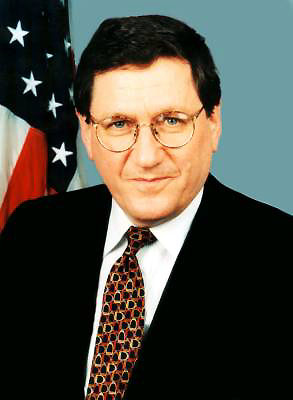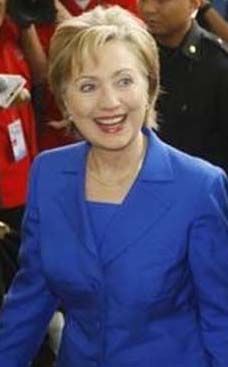
Few other diplomats can boast of the accomplishments of Mr.Holbrooke, 67, who negotiated the Dayton peace accords to end the war in Bosnia during the administration of President Bill Clinton. But as he returns to diplomacy after eight years of a Republican administration, he is still an outsider in the Obama circle. His longtime foreign policy pupil, Hillary Rodham Clinton, has the secretary of state job he always wanted. And he has taken on a task so difficult that merely averting disaster may be the only triumph. “We are still in the process of digging our way into the debris,”he said in an interview.“We’ve inherited an extraordinarily dysfunctional situation in which the very objectives have to be reviewed.” Mr.Obama and Mrs.Clinton chose Mr.Holbrooke because of his ability to coerce as well as cajole, to work closely with the military and to improvise inventive solutions to what others write off as insoluble problems. But no one yet knows how his often pyrotechnical style will work in an administration that prizes low-key competence or in a region that is dangerously unstable. “Richard C. Holbrooke is the diplomatic equivalent of a hydrogen bomb,”said Strobe Talbott, a former deputy secretary of state and a friend. Richard Holbrooke, Special Representative for Afghanistan and Pakistan under the Obama administration, is a top-ranking American diplomat, magazine editor, author, professor, and investment banker who served as Country director for Peace Corps Morocco between 1970 and 1972.
Hard-Driving Envoy Richard Holbrooke Back on World Stage
Hard-Driving Envoy Back on World Stage
009-02-18
By JODI KANTOR
Stashed in a drawer in his Manhattan apartment, a photograph shows Richard C.Holbrooke on a private visit to Afghanistan in 2006. He is mugging atop an abandoned Russian tank, flashing a grin and a sardonic V-for-victory sign. The pose is a little like Mr.Holbrooke himself: looming, theatrical, passionate, indignant.
Three years later, he has inherited responsibility for the terrain he surveyed from that tank. As President Obama’s special representative to Afghanistan and Pakistan, Mr.Holbrooke will help reformulate and carry out American policy in what many call the most problematic region on earth.
Between them, the two nations contain unstable governments, insurgencies, corruption and a drug trade, nuclear material, refugees, resentment of American power, a resurgent Taliban, and in the shadows of their tribal lands, Al Qaeda and presumably Osama bin Laden.
“You have a problem that is larger than life,”said Christopher R. Hill, a longtime colleague expected to be named as the new ambassador to Iraq.“To deal with it you need someone who’s larger than life.”
Few other diplomats can boast of the accomplishments of Mr.Holbrooke, 67, who negotiated the Dayton peace accords to end the war in Bosnia during the administration of President Bill Clinton. But as he returns to diplomacy after eight years of a Republican administration, he is still an outsider in the Obama circle. His longtime foreign policy pupil, Hillary Rodham Clinton, has the secretary of state job he always wanted. And he has taken on a task so difficult that merely averting disaster may be the only triumph.
“We are still in the process of digging our way into the debris,”he said in an interview.“We’ve inherited an extraordinarily dysfunctional situation in which the very objectives have to be reviewed.”
Mr.Obama and Mrs.Clinton chose Mr.Holbrooke because of his ability to coerce as well as cajole, to work closely with the military and to improvise inventive solutions to what others write off as insoluble problems. But no one yet knows how his often pyrotechnical style will work in an administration that prizes low-key competence or in a region that is dangerously unstable.
“Richard C. Holbrooke is the diplomatic equivalent of a hydrogen bomb,”said Strobe Talbott, a former deputy secretary of state and a friend.
Earlier this month, Mr.Holbrooke began a tour of the region , visiting highlevel officials and local ones, military bases, nongovernmental organizations, antinarcotics programs, refugee camps and the perilous tribal region. There is a reason for this wide-ranging tour: because official Afghan and Pakistani leaders are seen as weak, Mr.Holbrooke may have to seek alternative partners, a task to which he is naturally suited, according to Wesley K.Clark, the retired Army general.“Richard Holbrooke sees power the way an artist sees color,”General Clark said.
During the Bush years, he saw power only from the outside. On the morning of the September 11 attacks, Mr.Holbrooke, the former American ambassador to the United Nations, sat in traffic like any other New Yorker. Few New Yorkers, though, decided to inspect Afghanistan for themselves. In 2006 and 2008, he traveled privately around the country.
He went to a police training center in Herat, near the Iranian border, where he watched retired policemen from Alabama try to train Afghans. In Khost, he met with madrasa students and former Taliban fighters, pouring the tea himself to convey respect, according to Kael Weston, a State Department political officer who was his guide. At another stop, Mr.Holbrooke met with newly elected female leaders who barely seemed to know the basics of legislation. Everywhere, he passed enormous new villas built by narcotics smugglers.
For now, Mr.Holbrooke is both raising expectations and lowering them. He is talking about Afghanistan and Pakistan as his last and toughest mission. But along with the rest of Mr.Obama’s foreign policy staff, he is also trying to redefine success in the region, shifting away from former President George W.Bush’s grand, transformative goals and toward something more achievable.
During one of his visits to Afghanistan, at a prison north of Kabul, Mr.Holbrooke fell into a long conversation with a senior Taliban operative, a mullah who patiently answered questions and then asked one of his own:“When will you and the Americans be leaving?”
Mr.Holbrooke told him he did not know.“The more you think about it, the more it highlights the dilemma,”he said in the interview: the United States cannot say it is leaving, nor can it say it is staying forever.












